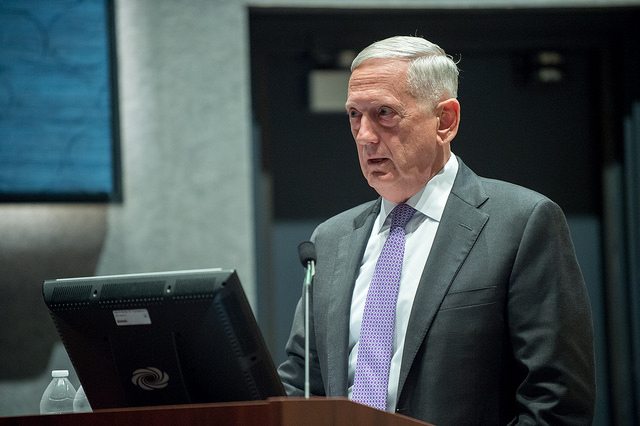American Secretary of Defense James Mattis held an informal briefing for the press on Tuesday, in which he addressed concerns about whether or not economic sanctions put into place by the United Nations and the American government were an effective means of dissuading Kim Jong un’s pursuit of nuclear weapons.
There has been a growing debate within the United States, and bolstered by third-party nations like Russia, about whether or not sanctions are an effective method of forcing a shift in North Korean policy. Kim Jong Un has claimed that no level of interference will be enough to force him to give up on what he seems to believe is the key to a new era in foreign policy for the reclusive state, one where Kim may use the threat of nuclear annihilation as a bargaining chip.
Secretary Mattis made his position on the topic clear, stating in no uncertain terms that sanctions are proving effective, though he also indicated that his criteria for success wasn’t quite as lofty as those who have hoped the financial chokehold would be enough to get the job done alone.
We are putting the leader in North Korea in a position to be aware of — [with] the international community voting unanimously twice now in the United Nations Security Council — … the increasing diplomatic isolation that comes with the economic sanctions,” Mattis said.
Mattis then pointed to his recent trip to Mexico, where he participated in the nation’s Independence Day celebrations, as a sign that the sanctions are working to unify the international community behind the cause of a denuclearized Korean peninsula. Prior to the Defense Secretary’s arrival, Mexican President Enrique Peña Nieto issued an executive order mandating that his nation adhere to the new sanctions voted into place by the UN Security Council last week. Later that same day, the Mexican government issued an order to North Korean Ambassador Kim Hyong Gil, giving him 72 hours to leave the country.
Since then, Spain, Peru, and Kuwait have all followed suit, ordering North Korean ambassadors and envoys out of their respective nations.
“That’s an example of what is working,” Mattis said. “It’s a pressurization effort to raise the cost to Pyongyang of continued testing of missiles and nuclear weapons.”
Mattis was then asked why the United States has not opted to shoot down any of the five ballistic missile launch tests that North Korea has conducted since January, to which Mattis simply replied, “Those missiles are not directly threatening any of us.”
“The bottom line,” he said, “is that if the missiles were a threat to Guam or Japan, that would elicit a different response from us.”
Many have voiced concerns about taking military action against North Korea, particularly as it seems likely that doing so would result in open war between North Korea and South Korea, where North Korea artillery that has been hidden and fortified for years would come to bear on the South Korean capital in Seoul, placing millions of lives in danger. Mattis has said before that there were kinetic options that would ensure Seoul was not placed at risk, but he has chosen not to discuss them, and this briefing was no different. When prodded, he reiterated that there were options on the table, but declined to discuss them.
“We will defend ourselves, our interests [and] our allies, and we work together very transparently and openly with our allies.” He concluded.
Already have an account? Sign In
Two ways to continue to read this article.
Subscribe
$1.99
every 4 weeks
- Unlimited access to all articles
- Support independent journalism
- Ad-free reading experience
Subscribe Now
Recurring Monthly. Cancel Anytime.


COMMENTS